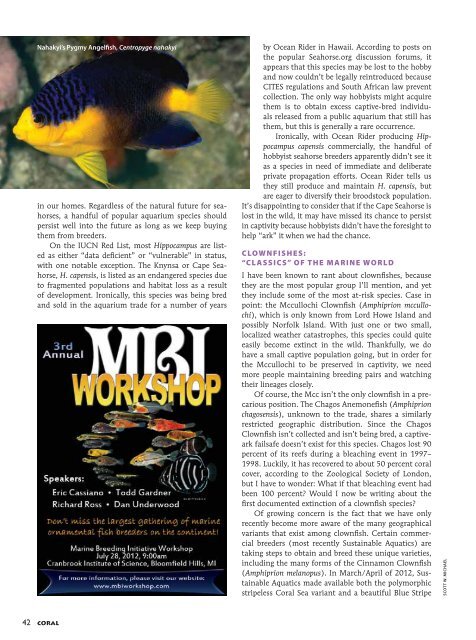Create successful ePaper yourself
Turn your PDF publications into a flip-book with our unique Google optimized e-Paper software.
Nahakyi’s Pygmy Angelfish, Centropyge nahakyi<br />
in our homes. Regardless of the natural future for seahorses,<br />
a handful of popular aquarium species should<br />
persist well into the future as long as we keep buying<br />
them from breeders.<br />
On the IUCN Red List, most Hippocampus are listed<br />
as either “data deficient” or “vulnerable” in status,<br />
with one notable exception. The Knynsa or Cape Seahorse,<br />
H. capensis, is listed as an endangered species due<br />
to fragmented populations and habitat loss as a result<br />
of development. Ironically, this species was being bred<br />
and sold in the aquarium trade for a number of years<br />
by Ocean Rider in Hawaii. According to posts on<br />
the popular Seahorse.org discussion forums, it<br />
appears that this species may be lost to the hobby<br />
and now couldn’t be legally reintroduced because<br />
CITES regulations and South African law prevent<br />
collection. The only way hobbyists might acquire<br />
them is to obtain excess captive-bred individuals<br />
released from a public aquarium that still has<br />
them, but this is generally a rare occurrence.<br />
Ironically, with Ocean Rider producing Hippocampus<br />
capensis commercially, the handful of<br />
hobbyist seahorse breeders apparently didn’t see it<br />
as a species in need of immediate and deliberate<br />
private propagation efforts. Ocean Rider tells us<br />
they still produce and maintain H. capensis, but<br />
are eager to diversify their broodstock population.<br />
It’s disappointing to consider that if the Cape Seahorse is<br />
lost in the wild, it may have missed its chance to persist<br />
in captivity because hobbyists didn’t have the foresight to<br />
help “ark” it when we had the chance.<br />
CLOWNFISHES:<br />
“CLASSICS” OF THE MARINE WORLD<br />
I have been known to rant about clownfishes, because<br />
they are the most popular group I’ll mention, and yet<br />
they include some of the most at-risk species. Case in<br />
point: the Mccullochi Clownfish (Amphiprion mccullochi),<br />
which is only known from Lord Howe Island and<br />
possibly Norfolk Island. With just one or two small,<br />
localized weather catastrophes, this species could quite<br />
easily become extinct in the wild. Thankfully, we do<br />
have a small captive population going, but in order for<br />
the Mccullochi to be preserved in captivity, we need<br />
more people maintaining breeding pairs and watching<br />
their lineages closely.<br />
Of course, the Mcc isn’t the only clownfish in a precarious<br />
position. The Chagos Anemonefish (Amphiprion<br />
chagosensis), unknown to the trade, shares a similarly<br />
restricted geographic distribution. Since the Chagos<br />
Clownfish isn’t collected and isn’t being bred, a captiveark<br />
failsafe doesn’t exist for this species. Chagos lost 90<br />
percent of its reefs during a bleaching event in 1997–<br />
1998. Luckily, it has recovered to about 50 percent coral<br />
cover, according to the Zoological Society of London,<br />
but I have to wonder: What if that bleaching event had<br />
been 100 percent? Would I now be writing about the<br />
first documented extinction of a clownfish species?<br />
Of growing concern is the fact that we have only<br />
recently become more aware of the many geographical<br />
variants that exist among clownfish. Certain commercial<br />
breeders (most recently Sustainable Aquatics) are<br />
taking steps to obtain and breed these unique varieties,<br />
including the many forms of the Cinnamon Clownfish<br />
(Amphiprion melanopus). In March/April of 2012, Sustainable<br />
Aquatics made available both the polymorphic<br />
stripeless Coral Sea variant and a beautiful Blue Stripe<br />
SCOTT W. MICHAEL<br />
42 CORAL

















